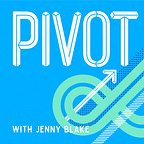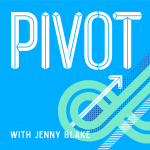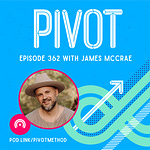Bravery requires being off balance. You will only find the courage to “cross the cringe chasm” by remembering that the risk of losing your identity is greater than the risk of losing approval.
As today’s guest Henna Pryor writes in her wonderful debut book, Good Awkward:
“The idea of releasing this book into the world without knowing how you’ll receive it makes me cringe. But it makes me cringe even more to imagine walking through life as a person who doesn’t write and release the book that matters so much to her because she’s worried how it will land. Either one is a risk.”
The Approval Paradox that we all confront is that we are social, communal creatures; for most of us, what other people think of us does matter. And yet, we can’t allow others’ approval to outweigh whether we personally improve. Cheers to the real reel, and I hope you enjoy this conversation as much as I did! Awkward bits and all :)
More About Henna: Henna Pryor, PCC is a highly sought after Workplace Performance Expert and an award-winning keynote speaker, author, and executive coach. Her clients call her their “secret weapon for impossible change,” an honor she wears proudly. She’s known for her science-backed approach to improving the performance, habits, and actions of hungry high achievers – in her fun, no-nonsense, no-jargon way – to move them from their first level of success to their next one. Today we’re talking about her bestselling book, Good Awkward: How to Embrace the Embarrassing and Celebrate the Cringe to Become The Bravest You, which received the rare Kirkus Star for excellence in writing.
🌟 3 Key Takeaways
Awkwardness is a social emotion (we don’t normally feel it by ourselves), and it’s one of discomfort: there is a momentary gap between our internal identity (the person we want to be), and the person people see on display. Awkwardness lives in uncertainty.
Crossing the Cringe Chasm: Remember ICC—improvement comes after cringe. In these moments, if your self-improvement and even self-identity is more important to you than other people’s approval, it’s time to jump.
There are two main kinds of stories we tell about ourselves: “All of our stories tend to focus on standout events, both good and bad, because those are the experiences that shape us, that our brain uses to make sense of our lives. People who are driven to contribute to society, embrace friction, and take braver risks are more likely to tell redemption stories about their lives—transitioning from a bad situation or downturn to good end result or upturn. The opposite of a redemption story is a contamination story, interpreting the situation as going from good to bad.”
✅ Try This Next
Reframe Stories of Awkwardness: Start by recalling a personally embarrassing or awkward situation, and write it down in detail. Bring yourself back to that place.
Ask yourself how would you have responded or acted differently if you were "lost in a crowd" or in a dark room where no one saw you. Would you still react the same way? What’s the difference?
Recognize a contamination story. Become aware of the negative beliefs or stories you tell yourself. Are they serving you and helping your development? Or are they keeping you stuck in a negative pattern, hindering your potential?
Phone a friend. If you are stuck in a contamination loop, seek a third-party perspective from a trusted friend who can help you find the lessons and the positive even when you can’t.
Reframe the story: Once you've created the mental space to recognize the negative story, find the lesson or positive in the story and refocus your story around it.
🔗 Resources Mentioned
Take the Self-Consciousness Scale: http://pryoritygroup.com/goodawkward
Articles: HuffPo—How To Embrace Your Inner Cringe And Make Awkwardness an Advantage
Research Studies: The Pratfall Effect, The Spotlight Effect
Rolling in D🤦🏻♀️h: The Business Yips and 51/49
Henna’s TEDx Talks: Why awkwardness is your secret weapon for risk-taking at work and The new way to brag in the modern world - and feel good doing it
Video: Vanessa Van Edwards interviewing Guy Raz—Successful People Can Be Awkward
📚 Books Mentioned
🎧 Related Episodes
Pivot: 329: Five Types of People-Pleasers from The Joy of Saying No with Natalie Lue
056: Perfection Detox with Petra Kolber and 112: Whose Voice is in Your Head?
Free Time: 031: Eleventh-Hour Gremlins
❤️ Enjoying the show? I'd be grateful for a rating and/or review! Even better? Share this episode with a friend :)
💌 Get my curated twice monthly PivotList newsletter
✍️ Connect with me on Substack: http://substack.com/@jennyblake
💻 Check out Pivot courses on LinkedIn Learning: Figuring Out Your Next Move, Holding 1:1 Career Conversations, Managing Introverts, Coaching New Hires, and Coaching New Managers
💬 I’d love to hear what’s on your mind! Take the Pivot listener survey
☎️ Submit a question or comment for future episodes
🎧 Make sure you’re subscribed wherever you listen to ‘casts
📝 Check out full show notes at http://pivotmethod.com/358












